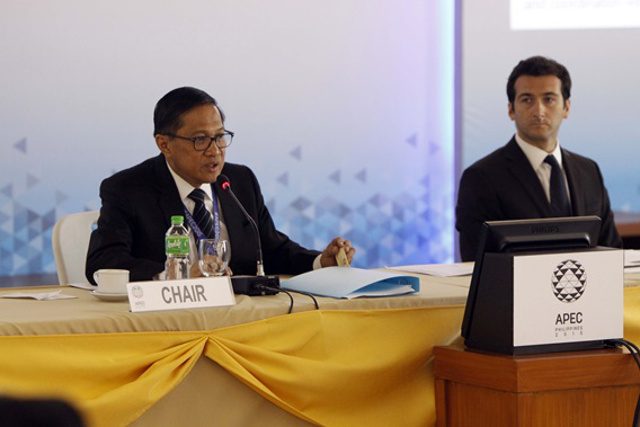SUMMARY
This is AI generated summarization, which may have errors. For context, always refer to the full article.

PAMPANGA, Philippines – The world’s largest economic cooperation organization is building a master plan to demolish the influence of terrorism groups across the Pacific Rim. It aims to do so by diluting their cash flow.
“Blocking the flow of finance to terrorist groups” is part of the Asia-Pacific Economic Cooperation’s (APEC) steps in regulating new payment systems that have emerged across economies worldwide, said Charles Jose, APEC Philippines 2015 spokesperson, on Friday, February 6.
On January 29, APEC’s counter-terrorism working group convened to strengthen the region’s capacity to fight terrorism and ensure security across its economies.
Oscar Valenzuela, chair of the APEC Counter-Terrorism Working Group (CTWG), said, We continue to see a rise in the spread of violent extremism worldwide.”
They met ahead of the APEC’s Senior Officials Meeting (APEC-SOM) Friday, February 6, where leaders discussed what China identified last year as key priorities in crafting groundwork policy for economic cooperation.
Valenzuela said discussing terrorism among APEC member-economies is crucial because advances in technology and communications make counter-terrorism a real challenge. (READ: Terrorists, social media, and spreading ideologies)
As this developed, the 21-member economic cooperation group said they agreed to coordinate with each other by implementing advance information systems, especially on newer ways to transact business.
In a press statement, Valenzuela said this includes aligning anti-money laundering and counter-terrorism regimes, as well as increasing cooperation “to boost relevant prosecutorial and law enforcement capacities in the region.”
“The introduction of new payment technology is exposing alarming gaps in regulation that open up opportunities for terrorists and other criminals to exploit for illicit or harmful purposes,” he explained.
Counter-terrorism economics
Shrinking the financial muscle of terrorist groups has been one of the goals of the international community, including the current chair of APEC, which is the Philippines.
According to the US Department of State, the Philippine government has seized bank deposits and real estate assets of up to $237,000 with links to the International Islamic Relief Organization and the Rajah Solaiman Movement.
In 2012, the country implemented a law criminalizing anyone engaged in transactions involving assets or funds with possible terror links. A year later, APEC highlighted the Philippines’ practice in a CTWG meeting in Manila.
Striking a balance between fighting terrorism and poverty has not been easy. While economies devise measures to block terror financing, it has also affected the cashflows to the world’s poorest – with banks discriminately terminating or refusing transactions, according to a Bloomberg report in January.
The member-economies are wary of the movement of terrorist recruits from one region to another, and wants to step up travel security while “limiting disruptions to travelers that move between APEC member economies for legitimate purposes.”
Recent threats
The Philippines’ security capacity was put to a test in January, when Pope Francis, head of the Roman Catholic Church, visited Manila and Tacloban.
The intelligence community identified at least 7 groups which could have an interest in plotting the Pope’s death, among them, fanatics, cults against the Roman Catholic Church, and groups with links to foreign terrorism groups.
But the recent beheading of a Japanese captive worried the APEC members, who said the threat these terror groups pose continues to rise.
“The death of two Japanese hostages at the hands of radicals and the pipeline of foreign funding and recruits to advance the terrorist agenda of such groups are signals of an increased threat across the Asia-Pacific,” said Valenzuela.
Meanwhile, the economies are currently developing a “major events” security framework where they would share knowledge about how they plan high-risk events which involve crowds of millions of people in one day. – Rappler.com
Add a comment
How does this make you feel?
There are no comments yet. Add your comment to start the conversation.